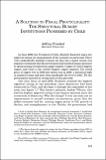| dc.contributor.author | Frankel, Jeffrey A. | |
| dc.coverage.spatial | CHILE | es_ES |
| dc.date.accessioned | 2019-11-01T00:05:50Z | |
| dc.date.available | 2019-11-01T00:05:50Z | |
| dc.date.issued | 2013 | |
| dc.identifier.isbn | 978-956-7421-37-4 | |
| dc.identifier.uri | https://hdl.handle.net/20.500.12580/3790 | |
| dc.description | In June 2008 the President of Chile Michelle Bachelet had a low approval rating for management of the economy in particular. There were undoubtedly multiple reasons for this but a major reason was popular resentment that the government had resisted intense pressure to spend soaring receipts from copper exports. Copper is Chile’s biggest export and Chile is the world’s biggest copper exporter. The world price of copper was at $800 per metric ton in 2008 a historical high in nominal terms and more than quadruple the level of 2001. Yet the government insisted on saving most of the proceeds. | |
| dc.format | .pdf | |
| dc.format.extent | Sección o Parte de un Documento | |
| dc.format.medium | p. 323-391 | |
| dc.language.iso | eng | |
| dc.publisher | Banco Central de Chile | |
| dc.relation.ispartof | Series on Central Banking Analysis and Economic Policies no. 17 | |
| dc.rights | Attribution-NonCommercial-NoDerivs 3.0 Chile | * |
| dc.rights.uri | http://creativecommons.org/licenses/by-nc-nd/3.0/cl/ | * |
| dc.subject | POLÍTICA FISCAL | es_ES |
| dc.subject | GASTOS PÚBLICOS | es_ES |
| dc.title | A solution to fiscal procyclicality: the structural budget institutions pioneered by Chile | |
| dc.type.doc | Artículo | |
| dc.file.name | BCCh-sbc-v17-p323_391 | |


